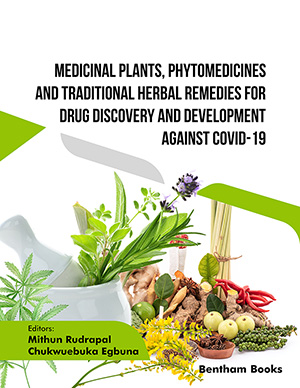Abstract
Background: Allergic Rhinitis (AR) is a common chronic nasal condition usually caused by allergens. The immune system overreacts when the body is exposed to allergens, releasing a lot of tissue chemicals that cause congestion, more secretions, and an inflammatory reaction in the nasal mucosa.
Method: In clinical practice, it remains a significant public health issue. Modern pharmacological studies have demonstrated that Magnolia Volatile Oil (MVO) has good anti-inflammatory, antibacterial, immunomodulatory, and other pharmacological effects. Previous research and literature reports have reported that MVO has good therapeutic effects on allergic rhinitis. However, due to the poor water solubility of Magnolia, its bioavailability is low. The purpose of this present work is to develop a new microemulsion formulation to improve the stability and bioavailability of MVO.
Results: The droplet size, PDI, and zeta potential of Magnolia volatile oil microemulsion (MVOME) were characterized along with its physical characteristics, and these values were found to be 14.270.03 nm, 0.09410.31, and -0.35850.12 mV, respectively, demonstrating the successful formation of microemulsion. In OVA-induced AR rats, MVO-ME dramatically reduced the serum levels of TNF-α, IL-1β, and IL-6 inflammatory factors. In addition, MVO-ME significantly inhibited the expression of protein levels of PPAR-γ and P65 in the nasal mucosa of AR rats. In this regard, we hypothesized that MVO-ME may play a therapeutic role in AR by activating the PPAR signaling pathway as well as inhibiting the activation of the NF/κB signaling pathway.
Conclusion: MVO-ME has systematic advantages, such as high solubility, bioavailability, etc. It is expected to be an efficient nano-drug delivery system for the clinical treatment of allergic rhinitis.
Keywords: Magnolia volatile oil, microemulsion, allergic rhinitis, inflammation, bioavailability, stability.
Current Drug Delivery
Title:Volatile Oil of Magnolia biondii Pamp. for Transnasal Administration: Its Preparation, Characterization, And Mechanism of Action in the Treatment of Allergic Rhinitis
Volume: 21 Issue: 10
Author(s): Qiuting Guo, Xuan Wang, Yao Wang, Peijie Zhou and Xiaofei Zhang*
Affiliation:
- Key Laboratory of Basic and New Drug Research of Traditional Chinese Medicine, Shaanxi University of Chinese Medicine, Xianyang 712046, Shaanxi, China
Keywords: Magnolia volatile oil, microemulsion, allergic rhinitis, inflammation, bioavailability, stability.
Abstract: Background: Allergic Rhinitis (AR) is a common chronic nasal condition usually caused by allergens. The immune system overreacts when the body is exposed to allergens, releasing a lot of tissue chemicals that cause congestion, more secretions, and an inflammatory reaction in the nasal mucosa.
Method: In clinical practice, it remains a significant public health issue. Modern pharmacological studies have demonstrated that Magnolia Volatile Oil (MVO) has good anti-inflammatory, antibacterial, immunomodulatory, and other pharmacological effects. Previous research and literature reports have reported that MVO has good therapeutic effects on allergic rhinitis. However, due to the poor water solubility of Magnolia, its bioavailability is low. The purpose of this present work is to develop a new microemulsion formulation to improve the stability and bioavailability of MVO.
Results: The droplet size, PDI, and zeta potential of Magnolia volatile oil microemulsion (MVOME) were characterized along with its physical characteristics, and these values were found to be 14.270.03 nm, 0.09410.31, and -0.35850.12 mV, respectively, demonstrating the successful formation of microemulsion. In OVA-induced AR rats, MVO-ME dramatically reduced the serum levels of TNF-α, IL-1β, and IL-6 inflammatory factors. In addition, MVO-ME significantly inhibited the expression of protein levels of PPAR-γ and P65 in the nasal mucosa of AR rats. In this regard, we hypothesized that MVO-ME may play a therapeutic role in AR by activating the PPAR signaling pathway as well as inhibiting the activation of the NF/κB signaling pathway.
Conclusion: MVO-ME has systematic advantages, such as high solubility, bioavailability, etc. It is expected to be an efficient nano-drug delivery system for the clinical treatment of allergic rhinitis.
Export Options
About this article
Cite this article as:
Guo Qiuting, Wang Xuan, Wang Yao, Zhou Peijie and Zhang Xiaofei*, Volatile Oil of Magnolia biondii Pamp. for Transnasal Administration: Its Preparation, Characterization, And Mechanism of Action in the Treatment of Allergic Rhinitis, Current Drug Delivery 2024; 21 (10) . https://dx.doi.org/10.2174/0115672018286048240229180813
| DOI https://dx.doi.org/10.2174/0115672018286048240229180813 |
Print ISSN 1567-2018 |
| Publisher Name Bentham Science Publisher |
Online ISSN 1875-5704 |
Call for Papers in Thematic Issues
Advancements in Robotic and AI-based Drug Discovery and Delivery for Neurological Disorders
Neurological disorders, including Alzheimer's disease, Parkinson's disease, epilepsy, and brain tumors, pose significant challenges in drug delivery due to the blood-brain barrier's intricate structure and the complexity of neuronal networks. Traditional drug delivery methods often fall short in reaching therapeutic concentrations within the central nervous system, limiting treatment efficacy and ...read more
Advances of natural products, bio-actives and novel drug delivery system against emerging viral infections
Due to the increasing prevalence of viral infections and the ability of these human pathogens to develop resistance to current treatment strategies, there is a great need to find and develop new compounds to combat them. These molecules must have low toxicity, specific activity and high bioavailability. The most suitable ...read more
Electrospun Fibers as Drug Delivery Systems
In recent years, electrospun fibers have attracted considerable attention as potential platforms for drug delivery due to their distinctive properties and adaptability. These fibers feature a notable surface area-to-volume ratio and can be intentionally designed with high porosity, facilitating an increased capacity for drug loading and rendering them suitable for ...read more
Emerging Nanotherapeutics for Mitigation of Neurodegenerative Disorders
Conditions affecting the central nervous system (CNS) present a significant hurdle due to limited access of both treatments and diagnostic tools for the brain. The blood-brain barrier (BBB) acts as a barrier, restricting the passage of molecules from the bloodstream into the brain. The most formidable challenge facing scientists is ...read more
 12
12
- Author Guidelines
- Graphical Abstracts
- Fabricating and Stating False Information
- Research Misconduct
- Post Publication Discussions and Corrections
- Publishing Ethics and Rectitude
- Increase Visibility of Your Article
- Archiving Policies
- Peer Review Workflow
- Order Your Article Before Print
- Promote Your Article
- Manuscript Transfer Facility
- Editorial Policies
- Allegations from Whistleblowers
Related Articles
-
Galectin-3 in Blood Serum and Lymphocytes as a Marker of Myocardial
Damage in Patients with Arterial Hypertension and COVID-19
Anti-Inflammatory & Anti-Allergy Agents in Medicinal Chemistry Implication of CD154/CD40 Interaction in Healthy and Autoimmune Responses
Current Immunology Reviews (Discontinued) Metabolic Dysfunction in Alzheimers Disease and Related Neurodegenerative Disorders
Current Alzheimer Research Drug Metabolizing Enzymes in the Perinatal and Neonatal Period: Differences in the Expression and Activity
Current Drug Metabolism Anaphylaxis: An Update on its Understanding and Management
Recent Patents on Inflammation & Allergy Drug Discovery Respiratory Hypoxia and Oxidative Stress in the Brain. Is the Endogenous Erythropoietin an Antioxidant?
Current Chemical Biology CA125: An Increasingly Promising Biomarker of Heart Failure
Current Pharmaceutical Design Proteins Involved in Salt Response Mechanisms in Poplar (Populus spp.)
Current Proteomics Headache in Multiple Sclerosis - Pharmacological Aspects
Current Pharmaceutical Design Passive Immunization as Tool to Identify Protective HIV-1 Env Epitopes
Current HIV Research Role of Sirtuins and Calorie Restriction in Neuroprotection: Implications in Alzheimers and Parkinsons Diseases
Current Pharmaceutical Design Oxidative Stress and the JNK Pathway are Involved in the Development of Type 1 and Type 2 Diabetes
Current Molecular Medicine Contribution of Platelet-Derived CD40 Ligand to Inflammation, Thrombosis and Neoangiogenesis
Current Medicinal Chemistry Prevention and Therapy of Prostate Cancer: An Update on Alternatives for Treatment and Future Perspectives
Current Drug Therapy Novel Therapies Against Aggressive and Recurrent Epithelial Cancers by Molecular Targeting Tumor- and Metastasis-Initiating Cells and Their Progenies
Anti-Cancer Agents in Medicinal Chemistry Mechanisms Involved in the Increased Hemolysis in the Fetus and Newborn
Current Pediatric Reviews New Insights on the Role of Bioactive Food Derivatives in Neurodegeneration and Neuroprotection
Current Pharmaceutical Design Differentiating the Dementias. Revisiting Synucleinopathies and Tauopathies
Current Alzheimer Research Preface
Current Medicinal Chemistry - Anti-Inflammatory & Anti-Allergy Agents Predicting Targeted Polypharmacology for Drug Repositioning and Multi- Target Drug Discovery
Current Medicinal Chemistry



























